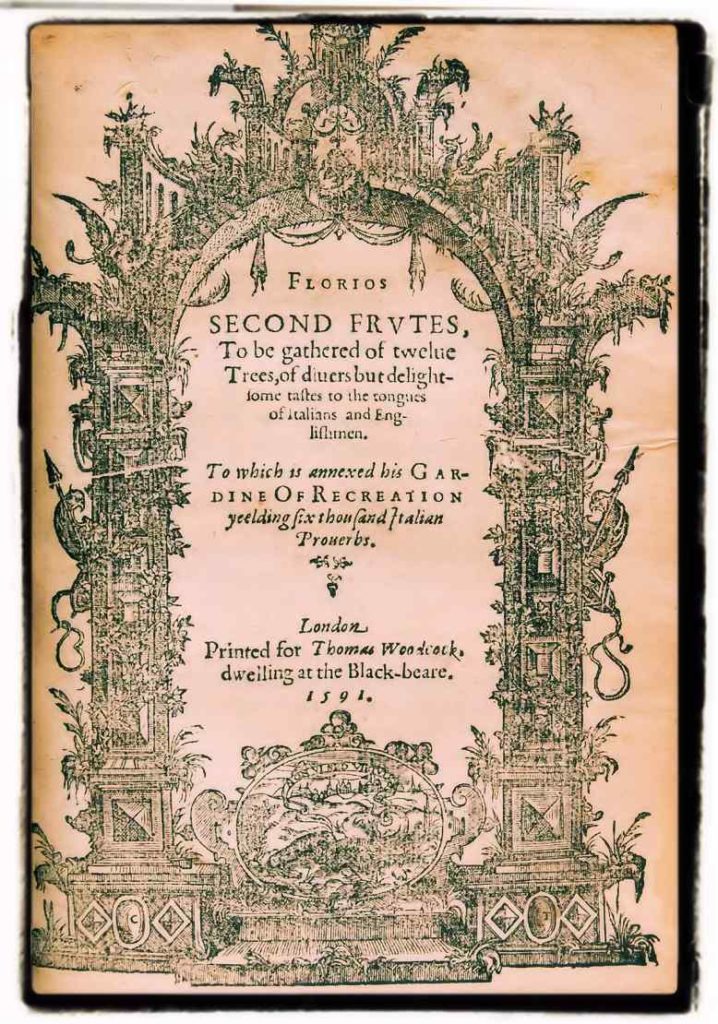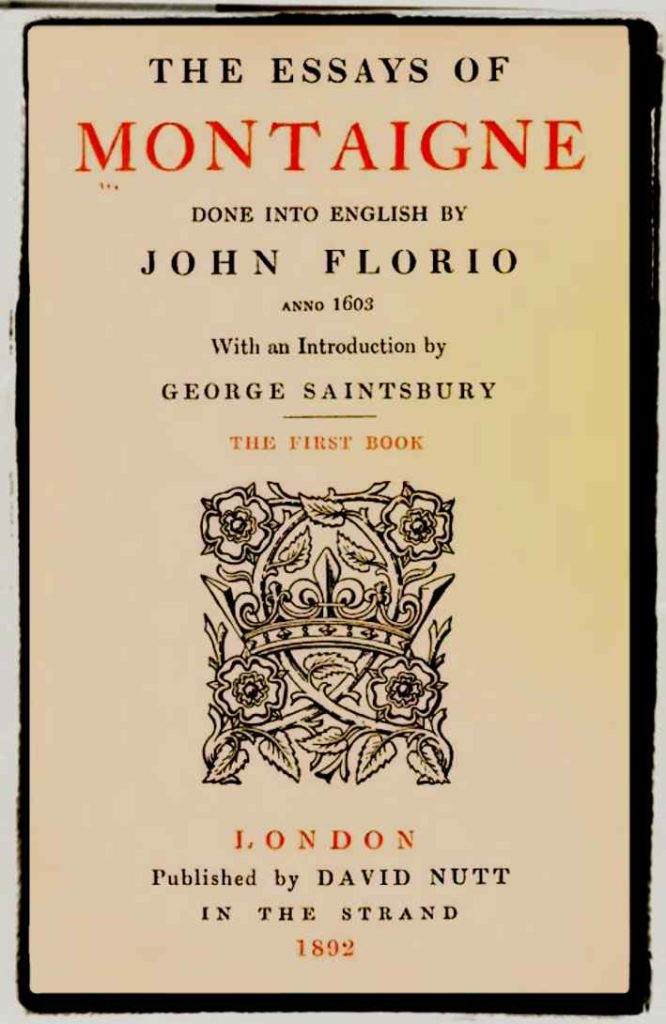
John Florio quotes, proverbs and aphorisms. If this done it may please you, as I wish it may, and I hope it shall, I with you shall be pleased. Though not, yet still I am the same resolute.
John Florio
Firste Fruites which yeelde familiar speech, merie prouerbes, wittie sentences, and golden sayings. Also a perfect induction to the Italian, and English tongues, as in the table appeareth. The like heretofore, neuer by any man published (1578).
John Florio
To use them (proverbs) is a grace, to understand them a good, but to gather them a paine to me, though game to thee. I, but for all that I must not scope without some new flout: now would I were by thee to give thee another, and surely I would give thee bread for cake. Farewell if thou meane well; els fare as ill, as thou wishest me to fare.
John Florio
For proverbs are the pith, the proprieties, the proofs, the purities, the elegancies, as the commonest so the commendablest phrases of a language. To use them is a grace, to understand them a good.
John Florio
Forgive thy friends: they would, but cannot praise, inough’ the wit, art, language of thy PLAYES: forgive thy foes; they will not praise thee. Why? Thy Fate hath thought it best, they should envy.
Faith, for thy FOXES sake, forgive them those who are not worthy to be friends, nor foes. Or, for their owne brave sake, let them be still fooles at thy mercy, and like what they will.
John Florio (London 1607 Verses devoted to Ben Jonson for the publication of Volpone)
As for critics I accompt of them as crickets (…) they lurke in corners but catch cold if they look out (…) they are bred of filth & fed with filth, what vermine to call them I know not, or wormes or flies or what worse? (…) they do not seek honie with the bee, but suck poison with the spider. (…) As for me, for it is I, and I am an Englishman in italiane; I know They have a knife at command to cut my throate “Un Inglese Italianato è un Diavolo incarnato”.
John Florio, To the Reader, Second Frutes
L. May a man know your name I pray?
G. Yea sir, why not? My name is William.
L. I pray you sir tell me your name.
G. I am called W. at your commandement.
L. What countrey man, and of what place are you?
G. I am Italian, and of Padoa, at your commandement.
John Florio, Second Frutes, VI
My old fellow Nolano (Giordano Bruno) told me that from translation all science had its off-spring.
John Florio, Montaigne’s Essays, To the reader (1603)
Unto a deadly disease, neyther Phisition nor phisick wil serve.
John Florio
A good husband makes a good wife.
John Florio
A deaf husband and a blind wife are always a happy couple.
John Florio
Musick is said to be the reioysing of the hart: musicke comforteth the mynde, and feareth the enimie.
John Florio
Praise the sea; on shore remain.
John Florio
Patience is the best medicine.
John Florio

To long for that which comes not. To lie a-bed and sleep not. To serve well and please not. To have a horse that goes not. To have a man obeys not. To lie in jail and hope not. To be sick and recover not. To lose one’s way and know not. To wait at door and enter not, and to have a friend we trust not: are ten such spites as hell hath not.
John Florio
Who has not served cannot command.
John Florio
England is the paradise of women, the purgatory of men, and the hell of horses.
John Florio
Night is the mother of thoughts.
John Florio
We neede not speak so much of love, al books are ful of love, with so many authours, that it were labour lost to speake of Love.
John Florio, First Fruites, Discourses uppon Musicke, and Love, 1578
Be circumspect how you offend schollers, for knowe, a serpent tooth bites not so ill, as dooth a schollers angrie quill.
John Florio
To long for that which comes not. To lie a-bed and sleep not. To serve well and please not. To have a horse that goes not. To have a man obeys not. To lie in jail and hope not. To be sick and recover not. To lose one’s way and know not. To wait at door and enter not, and to have a friend we trust not: are ten such spites as hell hath not.
John Florio
And I am free of Michaels occupation, I eate and drinke, and walke for recreation.
John Florio
If you will be a traveler, have always two bags very full. That is one of patience and another of money.
John Florio
Wisdom sails with wind and time.
John Florio
One hand washeth another, both the face.
John Florio
Poverty is no vice, but an inconvenience.
John Florio
From the physician and lawyer keep not the truth hidden.
John Florio
Fish marreth the water, and flesh doth dress it
John Florio
Who will not suffer labor in this world, let him not be born.
John Florio
What do the best then but glean after other’s harvest, borrow their colours, inherit their possessions?
John Florio

Why, but learning would not be made common. Yea, but learning cannot be too common, and the commoner the better. Why, but who is not jealous his mistress should be so prostitute? Yea, but this mistress is like air, fire, water: the more breathed, the clearer; the more extended, the warmer; the more drawn, the sweeter. It were inhumanity to coop her up, and worthy forfeiture close to conceal her.
John Florio
Even philosophy, grammar, rhetoric, logic, arithmetic, geometry, astronomy, music, and all the mathematics yet hold their name of the Greeks; and the Greeks drew their baptizing water from the conduit-pipes of the Egyptians, and they from the well-springs of the Hebrews or Chaldees.
John Florio
Why, but scholars should have some privilege of pre-eminence. So have they: they only are worthy translators.
John Florio
Why, but the vulgar should not know all. No, they cannot for all this, nor even scholars for much more; I would both could and knew much more than either doth or can.
John Florio
Why, but all would not be known of all. No, nor can: much more we know not than we know. All know something: none know all. Would all know all? They must break ere they be so big. God only: men far from God.
John Florio
Why, but pearls should not be cast to swine. Yet are rings put in their noses; and a swine should know his sty, and will know his meat and his medicine, and as much beside, as any swine doth suppose it to be marjoram.
John Florio
Why, but it is not well divinity should be a child’s or old wives’, a cobbler’s or clothier’s tale or table-talk. There is use, and abuse. Use none too much: abuse none too little.
John Florio
Why, but let learning be wrapped in a learned mantle. Yea, but to be unwrapped by a learned nurse. Yea, to be lapped up again; yea, and unlapped again. Else, hold we ignorance the mother of devotion, praying and preaching in an unknown tongue: as sorry a mother, as a seely daughter; a good mind perhaps, but surely an ill manner. If the best be mete for us, why should the best be barred?
John Florio
Why, but the best wrote best in a tongue more unknown. Nay, in a tongue more known to them that wrote, and not unknown of them to whom they wrote.
John Florio
Why, but more honour to him that speaks more learned. Yea, such perhaps as Quintilian’s orator: a learned man, I warrant him, for I understand him never a word.
John Florio
Why, but whom can I name that bore a great name for it? Nay, who great else, but either in part—as Plato and Aristotle out of many; Tully, Plutarch, Pliny out of Plato, Aristotle and many – or of purpose, as all that since have made most know the Greek, and almost the Latin, even translated their whole treatises?
John Florio
Why, but that Scaliger thinks that Ficinus by his rustical simplicity translated Plato as if an owl should represent an eagle, or some tara-rag player should act the princely Telephus with a voice as ragged as his clothes, a grace as bad as his voice.
John Florio
If the famous Ficinus were so faulty, who may hope to ’scape scot-free? But for him and us all, let me confess, as he here censureth, and let confession make half amends, that every language hath its genius and inseparable form; without, Pythagoras his “metempsychosis” it cannot rightly be translated.
John Florio
Why, then, belike I have done by Montaigne as Terence by Menander, made of good French no good English. If I have done no worse, and it be no worse taken, it is well. As he, if no poet, yet am I no thief, since I say of whom I had it, rather to imitate his and his authors’ negligence than any backbiter’s obscure diligence.
John Florio
Why, but essays are but men’s school-themes pieced together. You might as well say, several texts. All is in the choice and handling.
John Florio
As he, if no poet, yet am I no thief, since I say of whom I had it, rather to imitate his and his authors’ negligence than any backbiter’s obscure diligence.
John Florio
Read also William Shakespeare and John Florio
Read also John Florio’s Biography
You can also visit the following websites to find out more about John Florio:
John Florio website in English and Italian
Lamberto Tassinari videos on John Florio
John Florio is Shakespeare website
Shakespeare and Florio website
What is in a name? A lot, in some instances


